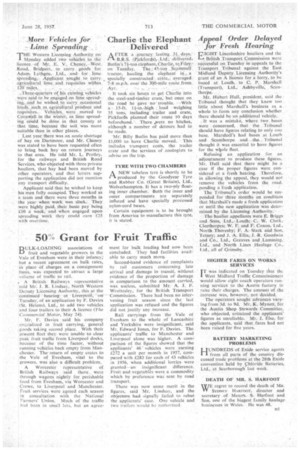50% Grant for Fruit Traffic
Page 49

If you've noticed an error in this article please click here to report it so we can fix it.
DULK-LOADING associations of
fruit and vegetable growers in the Vale of Evesham were in their infancy; but a recent agreement on bulk rates, in place of charges on a consignment basis, was expected to attract a large volume of traffic to rail.
. • A British Railways representative toid Mr. J. R. Lindsay, North Western. Deputy Licensing Authority, this at the continued bearing at Liverpool, on Tuesday, of an application by F. Davies (St. Helens). Ltd., to add two vehicles and four trailers to their A licence (The Commercial Motor', May 24).
Mr. F. Davies said his company s'peeialized in fruit carrying, general goods taking second place. With their present fleet they were unable to clear , peak fruit traffic from Liverpool docks, because of the time factor, without running vehicles back empty from Manchester. The returnof empty crates to the Vale of Evesham, vital to the growers, was also a difficult problem.
A Worcester representative of British Railways said there_ were through wagons nightly for perishable food from Evesham, via Worcester and Crewe, to Liverpool and -Manchester. Fruit services were agreed each season in consultation with the National Farmers' Union. Much of the traffic had been in small lots, but an agree ment for bulk loading had now been concluded. They had facilities available to carry much morn.
Second-hand evidence of complaints by rail customers concerning late arrival and damage in transit, without evidence of the proportion of damage in comparison to the amount carried, was useless, submitted Mr. A. J: F. Wrottesley, for the British Transport Commission. There had been no intervening fruit season since the last application was refused and the figures did not justify any increase.
Rail carryings from the Vale of Evesham to the whole of Lancashire and Yorkshire were insignificant, said Mr. Edward Jones, for F. Davies. The applicants' traffic to Manchester and Liverpool alone was higher. A comparison of the figures showed that the applicants' 46 vehicles were earning 1272 a unit per month in 1957, compared with £283 for each of 43 vehicles in 1956, when additional lorries were granted—an insignificant difference. Fruit and vegetables were a commodity which by preference was sent by road transport.
There was now some merit in the figures, said Mr. Lindsay, and the objectors had signally failed to rebut the applicants' case. One vehicle and two trailers would be authorized.








































































































































